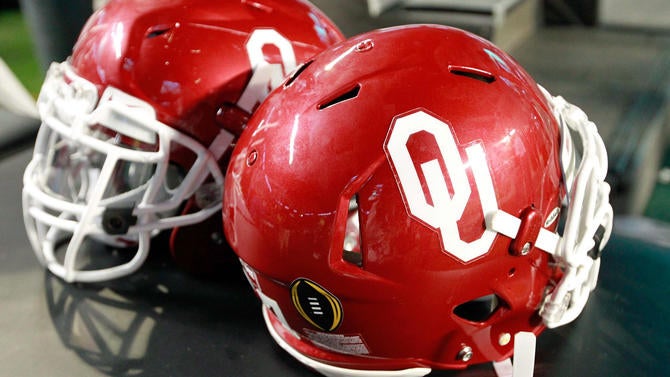NORMAN, Okla. -- David Boren sounded like a man resigned to a fate, just not necessarily his preferred fate.
We spent an hour with Oklahoma's president Thursday. This is the man who started the latest expansion frenzy less than a year ago, remember?
It was Boren who practically banged his shoe on the table, Khrushchev style, saying the Big 12 was "psychologically disadvantaged" with only 10 teams.
"I think [expansion is] something we should strive for," Boren told his school's student paper last June.
During Thursday's session with reporters, it's clear the most strident, outspoken supporter of Big 12 change suddenly might not be.
If anything, the 75-year-old former Oklahoma governor walked back expansion. That begged a key question asked privately as Boren left the OU Student Union following a regents meeting.
After all this, if the Big 12 does nothing, is Oklahoma committed to the conference for the remaining eight years of its media rights deal?
"We haven't even speculated on that," Boren said. "We're committed to the Big 12. We haven't even discussed the possibility."
There you go. Oklahoma is in this -- do or die, Cincinnati or BYU, status or quo. There are no deal breakers for Boren even if they come in the form of the 10-team Big 12 doing ... nothing.
This was the powerful president's chance to stir the expansion pot further. On his turf. To send a message to the world. After that hour, it sounded a lot the Big 12 may just take a pass on the whole thing -- expansion, network, championship game.
"I think we kind of got out ahead of ourselves," Boren said. "Somehow, the speculation got out ahead of what the reality on the ground is."
He added: "I personally do not have any candidates at this point."
What he does have is communication from 25 schools wanting to be in the Big 12. Those schools know this may be the best and last chance to brand themselves as big time. They're desperate; Boren isn't.
He sounded almost totally cool if things stay the way the are. Psychologically disadvantaged? That now sounds more like a neurological affliction controlled only by prescription drugs -- not conference upheaval.
Boren laid it out for us. He wants the focus to be on a network first. You don't expand unless you're creating game inventory for that network. With expansion naturally comes a conference championship game.
"If you're not going to have a network, you don't need to have an expansion," he said.
And a network -- it should be stressed -- is the least likely outcome of this discussion. The demographics don't seem to be there. History may record the SEC and Big Ten networks as colossal successes -- and that's it.
We already know expansion gets the league closer -- mathematically -- to College Football Playoff inclusion. A championship game delivers about $3 million per school annually.
The president sounded downright conciliatory toward Texas, OU's blood rival. We all know that nothing happens until Texas officials weigh in. They haven't, yet. The continued existence of the Longhorn Network is the elephant in the room that has to be addressed before anything happens.
"You've got to make Texas financially whole," Boren said. "You can't expect them to give up $15 million."
That's the cash Texas receives each year from ESPN for LHN. The network may losing money for ESPN, but the contract still says Texas has to get paid.
"They think I'm out to get Texas," Boren added. "I'm not out to get Texas."
What's next? Dogs and cats living together?
LHN may divide the Big 12, but don't forget the LHN was a key reason there still is a Big 12. The Pac-12 wouldn't accommodate the network's existence when Texas was considering heading west in 2010 and 2011. Meanwhile, the Big 12 didn't have a choice but to carefully steer around it like an oak tree had sprouted up in the middle of the interstate.
It's obvious Boren isn't going to necessarily self-combust if the conference stays like it is. It's hard to make a case for Big 12 change when Oklahoma played in both the College Football Playoff and Final Four since December.
"If you're competing with conferences with 14 and 12 members, are you more likely or less likely [to do that]?" Boren asked. "On the other hand, I don't have it in my mind that we have to be [bigger]."
As for Boren's power, he reiterated what CBS Sports reported earlier this week: He works at the leisure of the seven-member Board of Regents. If four of those members vote against expansion, that's Boren's Big 12 vote.
That would be quite a switch from where things seemed to be heading 10-plus months ago.
Since then, FedEx CEO Fred Smith reportedly wants to buy Memphis's way into the Big 12. UConn considers itself the Sixth Borough in terms of New York and clout and rep.
The truth is, if all these schools were such a good "fit," they'd be in Power Five leagues already. The market has spoken. For whatever reason, Connecticut, Memphis, UCF, etc. didn't make the cut when conferences were deciding the best combination to present to networks in order to make the most money.
BYU chose to strike out on its own in independence. Now it is beyond desperate to join a conference. Here's all you have to know about that situation: Coach Bronco Mendenhall left after 11 seasons for Virginia, a lesser program but one in a Power Five conference.
In reality, Boren set parameters last June that can't be met -- not judging by the roster of breathless expansion applicants currently banging on the door. He said the Big 12 has to be "very selective." Two more members would have to meet "very high criteria."
There are no two teams out there that as a pair make Big 12 football better. That fact isn't going to change no matter what the conference does. And maybe it doesn't matter. It certainly didn't matter to the Big Ten when it invited Maryland and Rutgers.
The metrics so far suggest the Big 12 could have better access to the College Football Playoff mathematically merely by expanding.
But this is a difference media climate. When the latest round of realignment kicked off in late 2009, networks had loads of cash willing to spend it on the right combinations.
Nebraska to the Big Ten? Great. Notre Dame (basketball) in the ACC? Half the Irish is better than none. Utah and Colorado in the Pac-12? About time snow skiing becomes a conference sport.
But now we're in a different economy. There's not as much money. ESPN and Fox already own the rights for most of the Big 12 expansion candidates you can name. Why would they want to pay more for those rights?
At the end of the last round of shuffling, only two schools nationwide -- Utah and TCU -- were promoted from non-BCS to BCS conferences. The Big 12 would equal that in one swoop with expansion.
Is that progress?
"This is the kind of decision that has to be reached by consensus," Boren said. "It's not the kind of thing you say, "OK, by a vote of 8-2, we're going to do this.'
"Either a consensus is going to be formed or it won't [be]."
That's a long way from psychologically disadvantaged.

![[object Object] Logo](https://sportshub.cbsistatic.com/i/2020/04/22/e9ceb731-8b3f-4c60-98fe-090ab66a2997/screen-shot-2020-04-22-at-11-04-56-am.png)

















